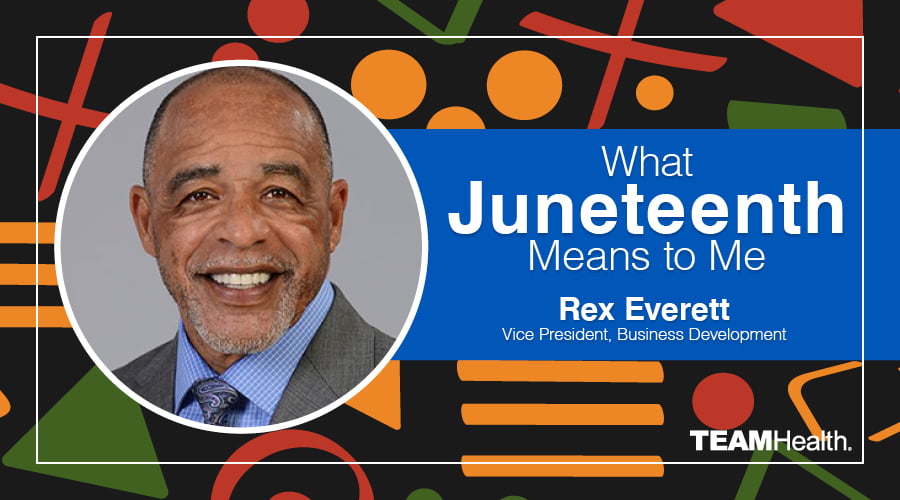By Rex Everett, Vice President, TeamHealth Business Development
My introduction to Juneteenth happened during my first year in healthcare management in 1980. I was transferred from Atlanta to Houston as a housekeeping supervisor in one of Houston’s largest hospitals. My director informed me that we usually have a lot of staff “call-in” to celebrate Juneteenth and I needed a plan to reduce the number of employees absent that day. I had literally never heard of Juneteenth and didn’t understand its importance. He explained to me that the Emancipation Proclamation was signed in January, but word that the slaves were freed did not reach Texas until June and that’s why it was celebrated. So, I had my staff refer all call-ins on that day to me. Everyone scheduled to work that day showed up. The next day I proudly accepted praise from management for having perfect attendance from my staff on Juneteenth.
In the days that followed, my employees, many of whom were old enough to be my parents or even grandparents made an effort to “school me” about the history of Juneteenth and why they celebrated this important day. This was done not out of anger, but out of a sincere interest to give me the perspective that would hopefully allow me to succeed in my new executive role so that I could then share that wisdom with others. To learn more, I went to the public library (the Google of 1980) to do my research.
I was appalled, angry, and embarrassed by my findings — it wasn’t a matter of months, it was two and a half years after signing the Emancipation Proclamation. I realized I needed to apologize to the staff for my dismissive behavior regarding the celebration.
I should have known better … or should I have?
I was born and raised in rural North Carolina from the 1950s to the 1970s. My father’s matriarchal grandfather, my great-grandfather, Linkfield Hawkins, was a slave who served with the Union Army during the Civil War. I remember my grandmother, born in 1886, telling the story of how the Yankees took him.
When the Union army captured a plantation, they would take the older boys and young men who were slaves back north to train in the infantry. My father’s patriarchal great-grandfather, my great-great-grandfather, John Everett, and his three brothers, Nathaniel, Daniel, and Aaron, were slaves who escaped the Everett Plantation. They swam to a Union gunboat off Wilmington, North Carolina, and enlisted in the Union Navy aboard the U.S.S. Arletta.
I knew my family history, but that was not the history I was taught in school about the Civil War. Instead, I was taught a version that glamorized the bravery of the Confederacy. Emphasis was placed on their heroes, Robert E. Lee, Stonewall Jackson and Jefferson Davis. In my history books, the pictures, drawings, and caricatures showed slaves fighting side-by-side with their masters against the Union Army, with a narrative from the teachers that said many slaves loved their masters so much they were willing to die for them in the war. I was not taught that approximately 170,000 Black men served the Union Army and 19,000 served in the Union Navy. There was barely a mention of Fredrick Douglass and nothing of Robert Smalls.
The freeing of slaves is only part of the story
So, do I get a pass for my ignorance at that time of the historical event Juneteenth represents? No. What is essential is what you do once you become aware. Therefore, I educated myself. I then had to answer the question from my perspective, knowing my history; What does Juneteenth mean to me?
I asked myself, what are we celebrating? If we celebrate the release from slavery and add a period, that’s only part of the story. We know that, although slavery ended, injustice against African Americans did not. I did not want to lose in the celebration the fact that the abolishment of slavery sent African Americans out of the proverbial frying pan and into the fire. Therefore, I choose to celebrate Juneteenth as a milestone in the ongoing struggle for justice and equality for all African Americans in the U.S.
No one reading this message today has ever owned a slave or ever been a slave. However, the history of the horrific institution of slavery is one that all Americans share. I believe we all, regardless of race, should celebrate Juneteenth as an anniversary commemorating the end of a painful part of American history. We should not hide or ignore our past. Instead, we should embrace it and work to ensure that past injustices never return in any form. If they do, we should recognize it and move swiftly to set things right. Happy Juneteenth, everyone!
